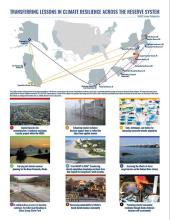
Awareness of climate change is growing, and many groups are addressing the issue and sharing lessons learned in order to help communities prepare in the face of uncertainty.
The pace of learning must also accelerate to keep up with the increasing rate at which climate change impacts natural and built environments. To meet this need, the National Estuarine Research Reserve System and its partners are exploring a range of approaches to enhance climate resilience and finding ways to transfer methods and lessons learned.
About this collection
The nine projects in this collection, supported by the NERRS Science Collaborative between 2015 and 2018, are a just a subset of the resilience and adaptation work being led by the reserves. This collection illustrates the value of the interconnected nature of the Reserve System and shows a few of the ways in which the reserves and their partners have worked to advance climate adaptation.
Collection resources
Panel Webinar: Session Recording (YouTube) | Webinar Summary Report (PDF)
On September 9, 2019, the Science Collaborative hosted a panel webinar featuring discussion among four panelists that have taken different approaches for helping communities anticipate and prepare for climate impacts. This webinar explored lessons learned about how best to accelerate learning and the transfer of ideas across the coastal management community.
Management Brief and Infographic: Accelerating Collective Learning and Action for Enhanced Climate Resilience (PDF)
This management brief, prepared by Science Collaborative Staff, highlights nine project teams, supported in part by the NERRS Science Collaborative, that have worked to enhance coastal resilience across the country. The map shows how the interconnectedness of the Reserve System facilitates collective learning and accelerated action for climate resilience. Numbered dots indicate the location of the lead reserve for each project. Color-coded lines indicate an exchange of information, tools, or activities among reserves and partners.
The management brief is the final version of the document incorporating content from the panel webinar. It was prepared by NERRS Science Collaborative staff, with input from Lisa Auermuller, Syverine Bentz, Philip Orton, Stuart Siegel, Jennifer Plunket, Annie Cox, Dani Boudreau, Jace Tunnell, Erika Washburn, and project partners.